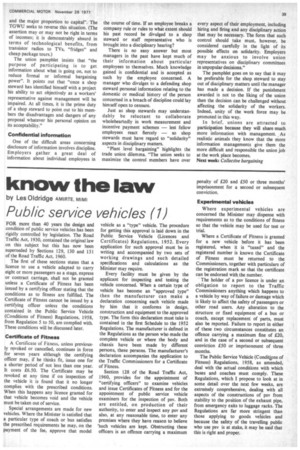know the law
Page 39

If you've noticed an error in this article please click here to report it so we can fix it.
by Les Oldridge AMIRTE, MIMI
Public service vehicles (1)
FOR more than 40 years the design and condition of public service vehicles has been rigidly controlled by legislation. The Road Traffic Act, 1930, contained the original law on this subject but this has now been superseded by Sections 129. 130 and 131 of the Road Traffic Act. 1960.
The first of these sections states that a licence to use a vehicle adapted to carry eight or more passengers as a stage, express or contract carriage, shall not be granted unless a Certificate of Fitness has been issued by a certifying officer stating that the conditions as to fitness are fulfilled. The Certificate of Fitness cannot be issued by a certifying officer unless the conditions contained in the Public Service Vehicle (Conditions of Fitness) Regulations, 1958. from Regulation 5 to 50, are complied with. These conditions will be discussed later.
Certificate of Fitness A Certificate of Fitness, unless previously revoked or cancelled, continues in force for seven years although the certifying officer may, if he thinks fit, issue one for a shorter period of not less than one year. It costs £6.50. The Certificate may be revoked at any time if on inspection of the vehicle it is found that it no longer complies with the prescribed conditions. When this happens any licence granted for that vehicle becomes void and the vehicle must be taken out of service.
Special arrangements are made for new vehicles. Where the Minister is satisfied that a particular type of coach or bus satisfies the prescribed requirements he may, on the payment of the fee, approve that model vehicle as a "type" vehicle. The procedure for getting this approval is laid down in the Public Service Vehicle (Licences and Certificates) Regulations, 1952. Every application for such approval must be in writing and accompanied by two sets of working drawings and such detailed specifications and calculations as the Minister may require.
Every facility must be given by the applicant for inspecting and testing the vehicle concerned. When a certain type of vehicle has become an "approved type" then the manufacturer can make a declaration concerning each vehicle made by him that it conforms in design, construction and equipment to the approved type. The form this declaration must take is contained in the first Schedule to the 1952 Regulations. The manufacturer is defined in the Regulations as the person who made the complete vehicle or where the body and chassis have been made by different persons, these persons. The manufacturer's declaration accompanies the application to the Traffic Commissioners for a Certificate of Fitness.
Section 128 of the Road Traffic Act, 1960, provides for the appointment of "certifying officers" to examine vehicles and issue Certificates of Fitness and for the appointment of public service vehicle examiners for the inspection of psv. Both are entitled, on production of their authority, to enter and inspect any psv and also. at any reasonable time, to enter any premises where they have reason to believe -Such vehicles are kept. Obstructing these officers is an offence carrying a maximum
penalty of £20 and £50 or three months' imprisonment for a second or subsequent conviction.
Experimental vehicles Where experimental vehicles are concerned the Minister may dispense with requirements as to the conditions of fitness so that the vehicle may be used for test or trial.
Where a Certificate of Fitness is granted for a new vehicle before it has been registered. when it is "taxed" and the registered number is known the Certificate of Fitness must be returned to the Commissioners, together with particulars of the registration mark so that the certificate can be endorsed with the number.
The holder of a psv licence is under an obligation to report to the Traffic Commissioners anything which happens to a vehicle by way of failure or damage which is likely to affect the safety of passengers or other road users. Any alteration to the structure or fixed equipment of a bus or coach, except replacement of parts. must also be reported. Failure to report in either of these two circumstances constitutes an offence carrying a maximum fine of £20, and in the case of a second or subsequent conviction £50 or imprisonment of three months.
The Public Service Vehicle (Conditions of Fitness) Regulations, 1958, as amended, deal with the actual conditions with which buses and coaches must comply. These Regulations, which I propose to look at in some detail over the next few weeks, are extremely conprehensive, dealing with all aspects of the constructions of psv from stability to the position of the exhaust pipe. from emergency exits to luggage racks. The Regulations are far more stringent than those applying to goods vehicles and because the safety of the travelling public who use psv is at stake, it may be said that this is right and proper.


















































































